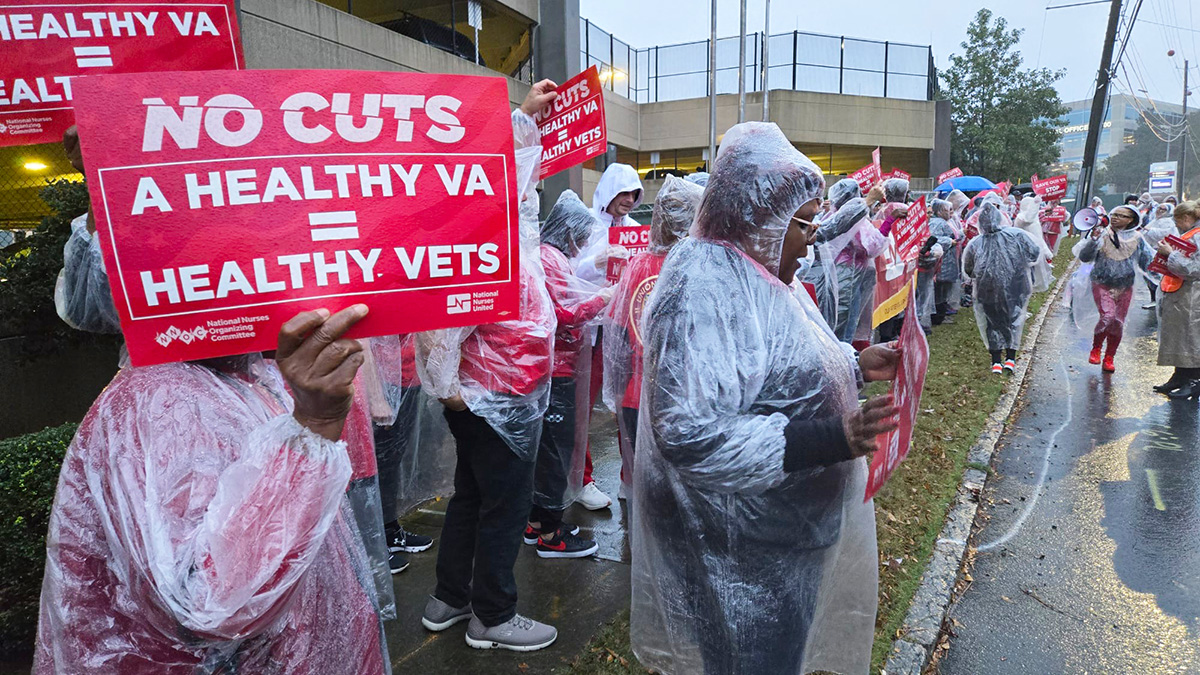VA nurses speak out

Staff report
National Nurse magazine - Oct | Nov | Dec 2024 Issue
VA nurses have been speaking out to demand that the Veterans Affairs Administration address their ongoing concerns about staffing, scheduling, and recruitment and retention. National hiring restrictions announced in January of this year have contributed to more than 66,000 vacancies across the VA health system, including 13,000 RN positions.
RNs say the barriers to hiring are putting patient safety at risk and undermining the VA’s commitment to providing veterans with high-quality, integrated, veteran-specific care that only VA nurses have the experience and expertise to provide. According to an August 2024 report by the VA Office of Inspector General, 82 percent of VAs are experiencing “severe shortages” of nurses.
National Nurses Organizing Committee, an affiliate of National Nurses United, represents more than 15,000 registered nurses, many of whom are veterans themselves, at 23 VHA facilities across the country. Nurses at the following facilities are members of NNOC/NNU.
Martinsburg, West Virginia
Registered nurses at the VA hospital in Martinsburg, W.V. held an informational picket in October to highlight the administration’s refusal to bargain with nurses over flexible scheduling policies that would improve patient care and nurse retention.
“Nurses’ schedules affect the veterans we care for,” said Beverly Simpson, RN in the acute-care infection control unit. “Nurses can provide the highest standard of care only when we have time in between our grueling shifts to rest, recover, and take care of our personal matters. With no meaningful engagement with our hospital’s director about improving our schedules or addressing a growing staffing crisis, we are taking our concerns directly to the community.”
The Martinsburg VA’s scheduling practices are driving away nurses who are choosing to work at area hospitals that offer flexible scheduling. Flexible scheduling is a permitted option in the VA employee handbook but it is not available in every unit of the hospital. When flexible scheduling was fully implemented in the intensive care unit of the Martinsburg VA hospital, the ICU became fully staffed.
More than 200 Martinsburg VA nurses signed a petition demanding schedules that both enhance the VA’s high level of care and nurses’ ability to maintain work-life balance.
Decatur, Georgia
In November, nurses at Joseph Maxwell Cleland Atlanta Veterans Administration Medical Center in Decatur, Ga., held a protest to speak out about their concerns regarding the VA budget, especially its impacts on short staffing, nurse retention, and nurses’ moral distress.
“We have identified solutions that can support nurse retention at the Atlanta VA,” said Belinda Howard, RN in the Atlanta VA cardiology unit. “However, there's a lack of transparency that prevents nurses from fully understanding how and when budget concerns are addressed. If we were provided with adequate funding and a management team that communicated effectively, our hospital could become a much better environment for both veterans and nurses.”
Atlanta VA nurses say that a budget crisis is negatively impacting patient care at the Atlanta VA, as it’s leading to an unsafe staffing crisis and problems with important medical equipment. Nurses say they are experiencing moral distress, which drives nurses away from the facility despite commonsense solutions to alleviate the staffing crisis. While recruitment has improved, retention issues continue, as more than 70 nurses have left the Atlanta VA this year.
Bronx, New York
Nurses from the James J. Peters Department of Veterans Affairs Medical Center in the Bronx traveled to Tarrytown, N.Y. in November to call on the VA to lift barriers to hiring staff to fill RN positions to ensure safe patient care. The “Care-A-Van” of RNs went to the VA regional office and headquarters for Vertical Integrated Service Network (VISN) 2, which oversees facilities in the New York/New Jersey VA Health Network, including the Bronx VA.
“With the proper resources, we can provide care that honors our veterans’ service and their sacrifices,” said Yesenia Novaton, RN at the Bronx VA and an NNU VA director. “When we don’t have enough staff, we are effectively cutting services to veterans. That is why we are calling on the VA to lift all barriers currently in place to hiring sufficient nurses, so we can get back to providing holistic, specialized, veteran-centric care to our nation's heroes.”
Due to a lack of nurses, management is mandating involuntary overtime, forcing nurses to work after the end of their shift or pick up extra shifts on their biweekly schedules. There are not enough RNs to cover patients coding, rapid responses, or routine transportation and testing needs.